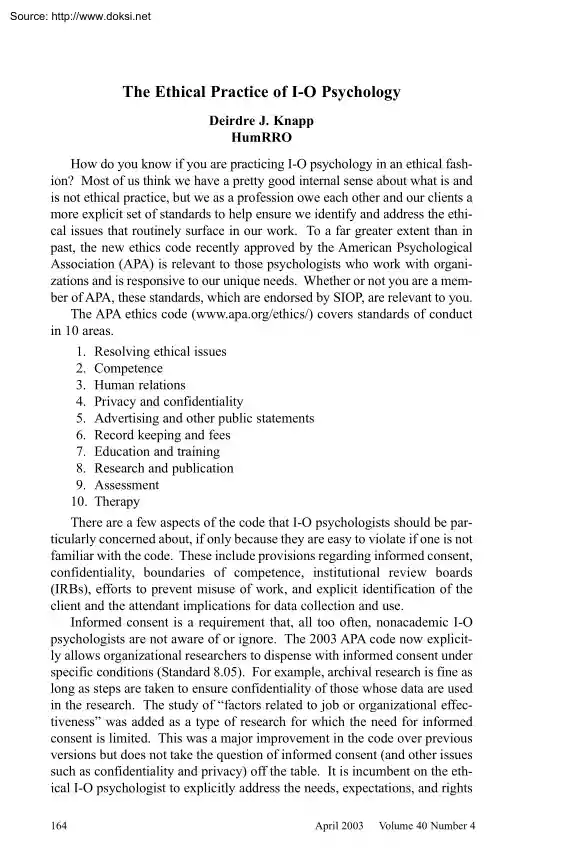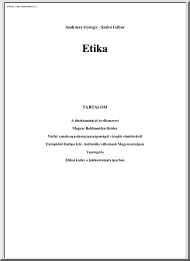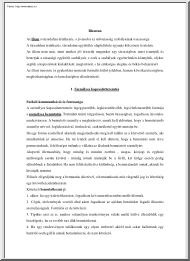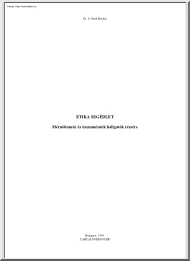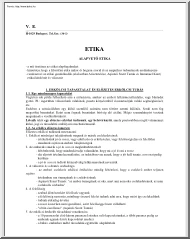Datasheet
Year, pagecount:2003, 2 page(s)
Language:English
Downloads:2
Uploaded:May 24, 2018
Size:521 KB
Institution:
-
Comments:
Attachment:-
Download in PDF:Please log in!
Comments
No comments yet. You can be the first!Most popular documents in this category
Content extract
Source: http://www.doksinet The Ethical Practice of I-O Psychology Deirdre J. Knapp HumRRO How do you know if you are practicing I-O psychology in an ethical fashion? Most of us think we have a pretty good internal sense about what is and is not ethical practice, but we as a profession owe each other and our clients a more explicit set of standards to help ensure we identify and address the ethical issues that routinely surface in our work. To a far greater extent than in past, the new ethics code recently approved by the American Psychological Association (APA) is relevant to those psychologists who work with organizations and is responsive to our unique needs. Whether or not you are a member of APA, these standards, which are endorsed by SIOP, are relevant to you The APA ethics code (www.apaorg/ethics/) covers standards of conduct in 10 areas. 1. Resolving ethical issues 2. Competence 3. Human relations 4. Privacy and confidentiality 5. Advertising and other public statements 6.
Record keeping and fees 7. Education and training 8. Research and publication 9. Assessment 10. Therapy There are a few aspects of the code that I-O psychologists should be particularly concerned about, if only because they are easy to violate if one is not familiar with the code. These include provisions regarding informed consent, confidentiality, boundaries of competence, institutional review boards (IRBs), efforts to prevent misuse of work, and explicit identification of the client and the attendant implications for data collection and use. Informed consent is a requirement that, all too often, nonacademic I-O psychologists are not aware of or ignore. The 2003 APA code now explicitly allows organizational researchers to dispense with informed consent under specific conditions (Standard 8.05) For example, archival research is fine as long as steps are taken to ensure confidentiality of those whose data are used in the research. The study of “factors related to job or
organizational effectiveness” was added as a type of research for which the need for informed consent is limited. This was a major improvement in the code over previous versions but does not take the question of informed consent (and other issues such as confidentiality and privacy) off the table. It is incumbent on the ethical I-O psychologist to explicitly address the needs, expectations, and rights 164 April 2003 Volume 40 Number 4 Source: http://www.doksinet of the employees and job applicants from whom they collect data, whether for applied research or consulting purposes. There are several standards in the code that relate to these considerations. I-O psychologists may unintentionally minimize the privacy issues raised by their work because we often work with tests and assessments that present little potential for harm. But some assessments tap into past behavior and personal traits that, although job-related, open the window to a person’s mental health well-being. The
I-O psychologist must prepare examinees for the experience (e.g, with applicable informed consent and limits on confidentiality statements) and be prepared for the potentially harmful emotional aftermath an examinee could experience following some of these assessments This raises the question of the set of standards related to boundaries of competence (Standard 2). Although many of us are sensitive to this issue when it pertains to clinical psychologists practicing in organizations, we may not be as vigilant in considering our own limitations. How many I-O psychologists have offered executive coaching services with little or no formal training in counseling techniques? We should critically examine our own qualifications as we venture into such territory. Standard 3.11 of the code is new and pertains specifically to those psychologists delivering services “to or through organizations” It requires, among other things, the psychologist to make clear who the client is (e.g, the
employer and not employees who will be assessed), limits on confidentiality for any information collected, and how the information will be used. If you see that your work is being misused, at least try to do something about it (Standard 1.01) I-O psychologists who develop systems (eg, for applicant screening) that an employer can easily alter after they have left the scene are particularly prone to this problem. It is important to recognize that there may be other requirements pertaining to the conduct of particular projects. Applied research activities, regardless of the sponsor, are generally subject to a faculty member’s university IRB. Applied research supported by the federal government is subject to very specific requirements, including IRB approval and informed consent obligations (see Title 45 CFR Part 46 at http://ohrp.osophsdhhsgov/polasurhtm) The Standards for Educational and Psychological Testing (AERA, APA, & NCME, 1999) also address these requirements. For those
applied researchers who do not have ready access to an IRB through their employers, there are other options. A list of federally approved IRBs is available at http://ohrp.citnihgov/search/asearchasp There has been discussion of SIOP sponsoring an IRB as a resource for its members. This would make it much easier for organizational practitioner researchers to comply with the letter and spirit of ethics requirements. If an IRB is not available, do not presume to make these judgments (e.g, whether informed consent is required) in a vacuum. Consult with others to help ensure your work does not infringe on the rights of your participants. The Industrial-Organizational Psychologist 165
Record keeping and fees 7. Education and training 8. Research and publication 9. Assessment 10. Therapy There are a few aspects of the code that I-O psychologists should be particularly concerned about, if only because they are easy to violate if one is not familiar with the code. These include provisions regarding informed consent, confidentiality, boundaries of competence, institutional review boards (IRBs), efforts to prevent misuse of work, and explicit identification of the client and the attendant implications for data collection and use. Informed consent is a requirement that, all too often, nonacademic I-O psychologists are not aware of or ignore. The 2003 APA code now explicitly allows organizational researchers to dispense with informed consent under specific conditions (Standard 8.05) For example, archival research is fine as long as steps are taken to ensure confidentiality of those whose data are used in the research. The study of “factors related to job or
organizational effectiveness” was added as a type of research for which the need for informed consent is limited. This was a major improvement in the code over previous versions but does not take the question of informed consent (and other issues such as confidentiality and privacy) off the table. It is incumbent on the ethical I-O psychologist to explicitly address the needs, expectations, and rights 164 April 2003 Volume 40 Number 4 Source: http://www.doksinet of the employees and job applicants from whom they collect data, whether for applied research or consulting purposes. There are several standards in the code that relate to these considerations. I-O psychologists may unintentionally minimize the privacy issues raised by their work because we often work with tests and assessments that present little potential for harm. But some assessments tap into past behavior and personal traits that, although job-related, open the window to a person’s mental health well-being. The
I-O psychologist must prepare examinees for the experience (e.g, with applicable informed consent and limits on confidentiality statements) and be prepared for the potentially harmful emotional aftermath an examinee could experience following some of these assessments This raises the question of the set of standards related to boundaries of competence (Standard 2). Although many of us are sensitive to this issue when it pertains to clinical psychologists practicing in organizations, we may not be as vigilant in considering our own limitations. How many I-O psychologists have offered executive coaching services with little or no formal training in counseling techniques? We should critically examine our own qualifications as we venture into such territory. Standard 3.11 of the code is new and pertains specifically to those psychologists delivering services “to or through organizations” It requires, among other things, the psychologist to make clear who the client is (e.g, the
employer and not employees who will be assessed), limits on confidentiality for any information collected, and how the information will be used. If you see that your work is being misused, at least try to do something about it (Standard 1.01) I-O psychologists who develop systems (eg, for applicant screening) that an employer can easily alter after they have left the scene are particularly prone to this problem. It is important to recognize that there may be other requirements pertaining to the conduct of particular projects. Applied research activities, regardless of the sponsor, are generally subject to a faculty member’s university IRB. Applied research supported by the federal government is subject to very specific requirements, including IRB approval and informed consent obligations (see Title 45 CFR Part 46 at http://ohrp.osophsdhhsgov/polasurhtm) The Standards for Educational and Psychological Testing (AERA, APA, & NCME, 1999) also address these requirements. For those
applied researchers who do not have ready access to an IRB through their employers, there are other options. A list of federally approved IRBs is available at http://ohrp.citnihgov/search/asearchasp There has been discussion of SIOP sponsoring an IRB as a resource for its members. This would make it much easier for organizational practitioner researchers to comply with the letter and spirit of ethics requirements. If an IRB is not available, do not presume to make these judgments (e.g, whether informed consent is required) in a vacuum. Consult with others to help ensure your work does not infringe on the rights of your participants. The Industrial-Organizational Psychologist 165
